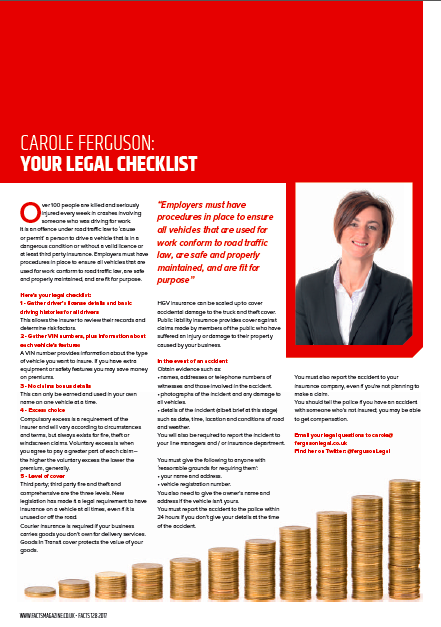Over 100 people are killed and seriously injured every week in crashes involving someone who was driving for work.
It is an offence under road traffic law to ‘cause or permit’ a person to drive a vehicle that is in a dangerous condition or without a valid licence or at least third party insurance. Employers must have procedures in place to ensure all vehicles that are used for work conform to road traffic law, are safe and properly maintained, and are fit for purpose.
Here’s your legal checklist:
1 Gather driver’s license details and basic driving histories for all drivers
This allows the insurer to review their records and determine risk factors.
2 Gather VIN numbers, plus information about each vehicle’s features
A VIN number provides information about the type of vehicle you want to insure. If you have extra equipment or safety features you may save money on premiums.
3 No claims bonus details
This can only be earned and used in your own name on one vehicle at a time.
4 Excess choice
Compulsory excess is a requirement of the insurer and will vary according to circumstances and terms, but always exists for fire, theft or windscreen claims. Voluntary excess is when you agree to pay a greater part of each claim – the higher the voluntary excess the lower the premium, generally.
5 Level of cover
Third party; third party fire and theft and comprehensive are the three levels. New legislation has made it a legal requirement to have insurance on a vehicle at all times, even if it is unused or off the road.
Courier insurance is required if your business carries goods you don’t own for delivery services.
Goods In Transit cover protects the value of your goods.
HGV insurance can be scaled up to cover accidental damage to the truck and theft cover.
Public liability insurance provides cover against claims made by members of the public who have suffered an injury or damage to their property caused by your business.
In the event of an accident
Obtain evidence such as :
* names, addresses or telephone numbers of witnesses and those involved in the accident;
* photographs of the incident and any damage to all vehicles; and
* details of the incident (albeit brief at this stage) such as date, time, location and conditions of road and weather.
You will also be required to report the incident to your line managers and / or insurance department.
You must give the following to anyone with ‘reasonable grounds for requiring them’:
- your name and address
- vehicle registration number
You also need to give the owner’s name and address if the vehicle isn’t yours.
You must report the accident to the police within 24 hours if you don’t give your details at the time of the accident.
You must also report the accident to your insurance company, even if you’re not planning to make a claim.
You should tell the police if you have an accident with someone who’s not insured; you may be able to get compensation.




